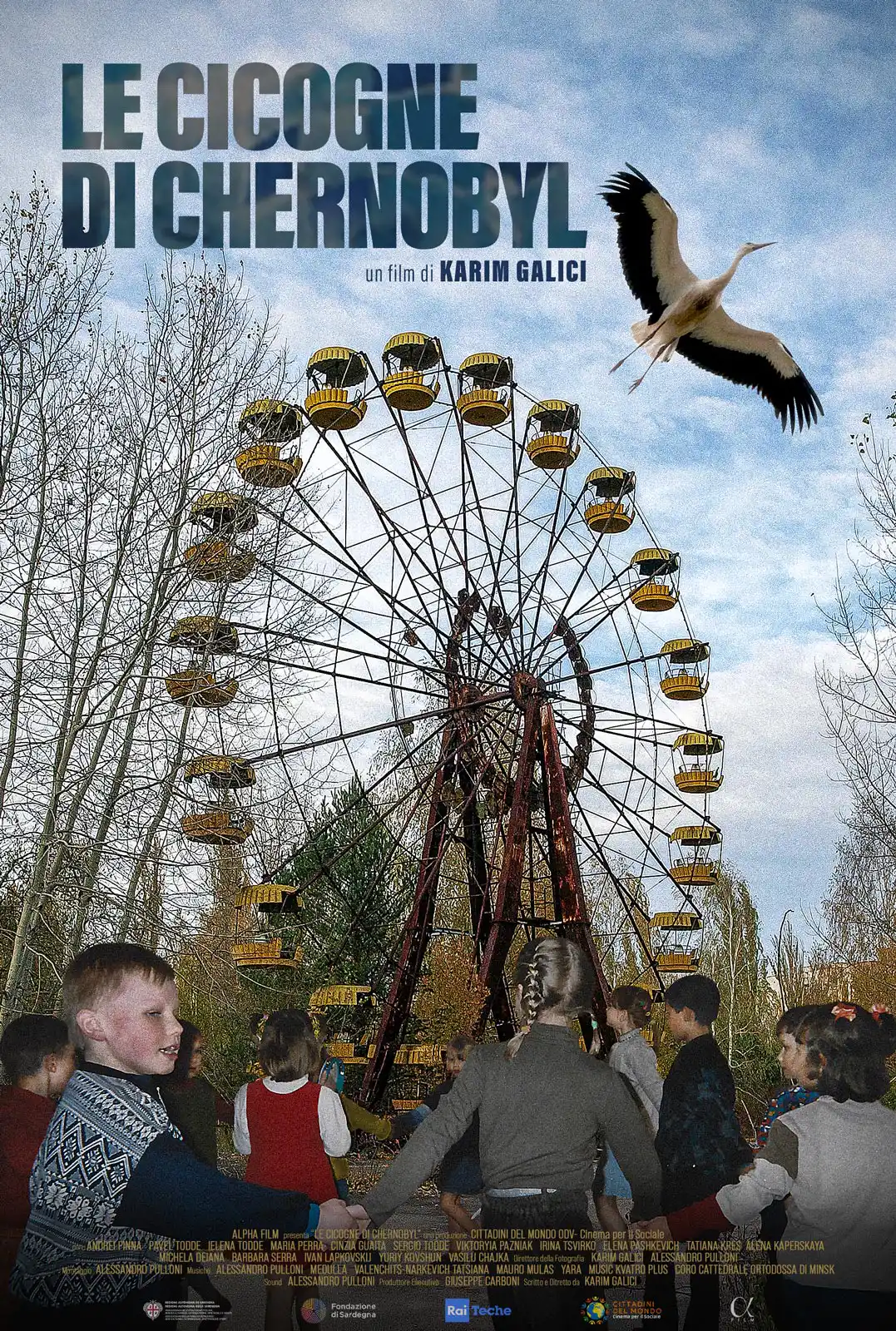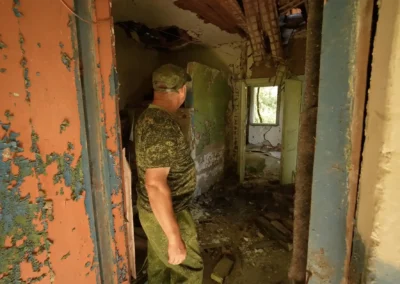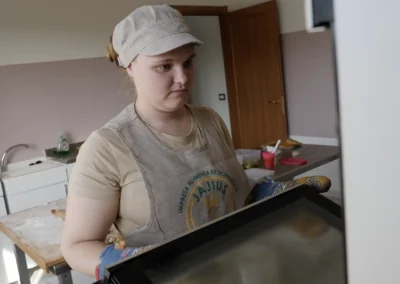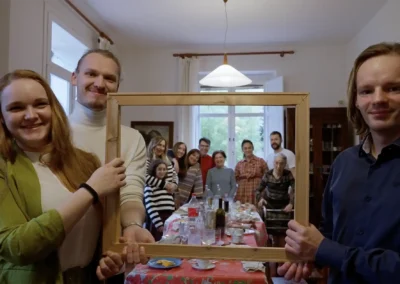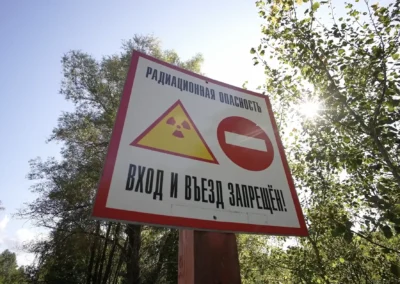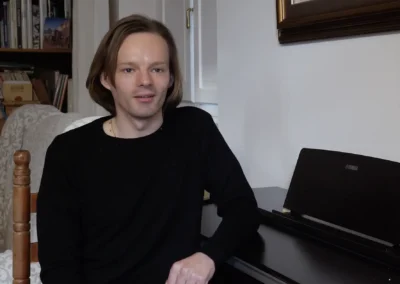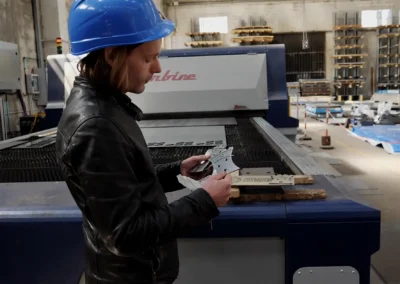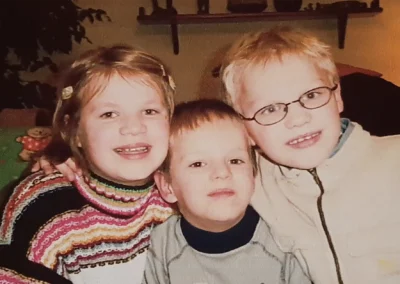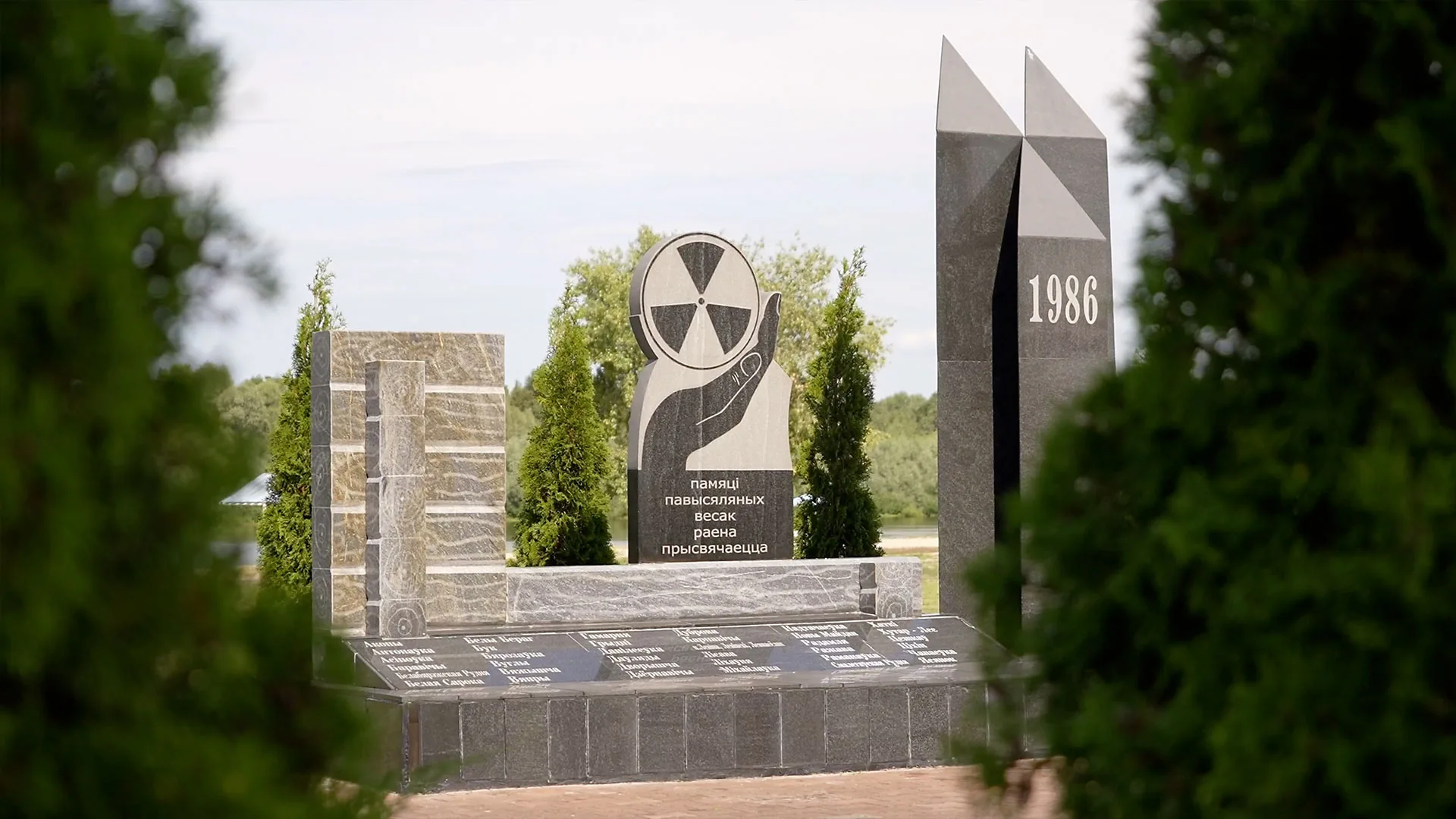
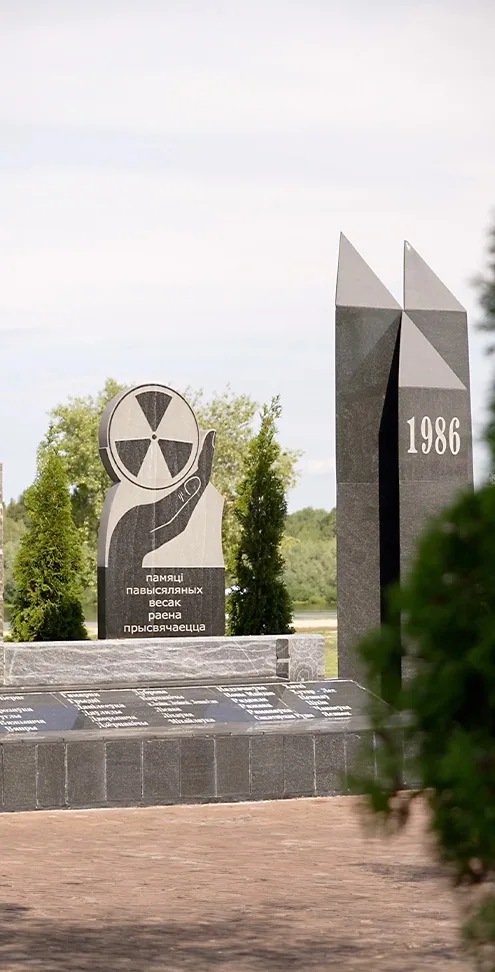
The Storks of Chernobyl
(Le cicogne di Chernobyl)
by Karim Galici
A poetic reflection on Chernobyl’s legacy, between resilience and hope.
Synopsis
The Storks of Chernobyl
(Le cicogne di Chernobyl)
by Karim Galici
A poetic reflection on Chernobyl’s legacy, between resilience and hope.
Synopsis
The Storks
of Chernobyl
( Le cicogne di Chernobyl )
Italy, 2025 / 65′ – 40′
a film by
Karim Galici
with
| Andrei Pinna Pavel Todde Ielena Todde Maria (Mimma) Perra Cinzia Guaita Sergio Todde Viktoryia Pazniak Irina Tsvirko Elena Pashkevich Tatiana Kres Alena (Eliana) Kaperskaya Michela Deiana Barbara Serra Ivan Lapkovskij Yuriy Kovshun Vasilij Chajka
|
| Written and Directed by | Karim Galici |
| Directors of Photography |
Karim Galici |
| Editor | Alessandro Pulloni |
| Music |
Alessandro Pulloni |
| Sound | Alessandro Pulloni |
| Executive Producer | Giuseppe Carboni |
| Production | Cittadini del Mondo ODV – Cinema per il Sociale |
| Distribution | Alpha Film |

The Director
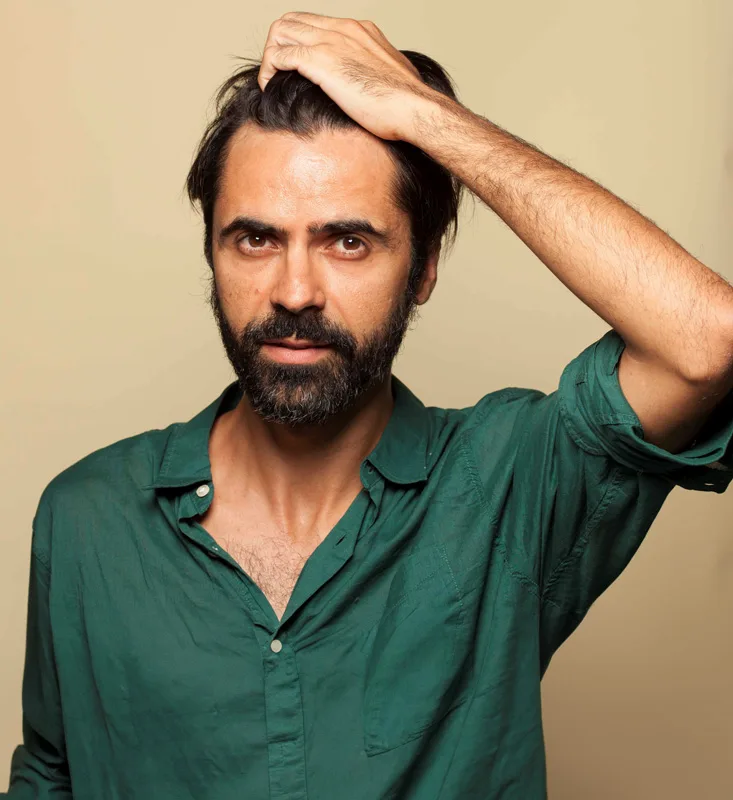
Karim Galici
Biofilmography
Karim Galici (Cagliari, 1977) is a director, screenwriter, actor and cultural manager.
He graduated in DAMS (Drama, Art, and Music Studies) at Roma Tre University and obtained a Master’s in Performing Arts Management at Bocconi University, in collaboration with the Teatro alla Scala Academy and the Piccolo Teatro di Milano – Teatro d’Europa. He trained at the International Acting Studio “Permis De Conduire” and began his acting career in the late 1990s.
His directorial debut was “Grado Zero” (2000), selected by several Italian festivals, including the Arcipelago – International Short Film Festival. Since 2020, he has collaborated with Cittadini del Mondo – Cinema per il Sociale, creating a documentary trilogy: “Dall’Est con amore. Quattro storie di vita e integrazione” (2020), “La vita sopra ogni cosa. Storia di un Padre ortodosso in Sardegna” (2021), and “Le cicogne di Chernobyl” (2025). In 2024, he made the documentary films “Run, Trip, Life. Il Viaggio della Vita,” produced by Whable and shot in Italy and California, and “Fiori SottoPelle,” produced by OltreSardegna.
Alongside his film work, he has been active in theatre with various companies, including The Living Theatre and the Teatro de los Sentidos. He is the founder of Impatto Teatro in Rome, where he oversees the documentaries about its projects and currently serves as artistic director.
“Le cicogne di Chernobyl” / 40’ e 64’/ 2025
“Fiori sottopelle”/ 43’/ 2024
“Run Trip Life. Il Viaggio della Vita” / 44’ / 2024
“Storie di Naturale Follia” / 25’ / 2023
“La vita sopra ogni cosa” / 25’ / 2021
“Dall’Est con amore” / 29’ / 2020
“In a Mosaic World” / 15’ / 2019
“Vita nella città” / 30’ / 2019
“Invisible Space – Viaggio nelle città invisibili” / 30’ / 2017
“Grado zero” / 20’ / 2000
Director's statement
For years, with Cittadini del Mondo-Cinema per il Sociale, we had been nurturing the idea of making a documentary about the Chernobyl Project, and I was very attracted by the powerful idea of resilience it embodied: a term perhaps overused, but in this case, profoundly fitting and true. I particularly refer to the extraordinary ability to react of the children from the contaminated areas, who managed to overcome traumas and difficulties to rebuild a new life and achieve great results.
When I started working on this documentary, I sensed its magnitude, but the reality of the stories surpassed all my expectations. I understood even more how childhood can be different depending on where you are born and that it doesn’t always coincide with the most beautiful period of life.
In the research and interviews, we started from stories of hospitality, some of which turned into adoptions: experiences that deeply moved me and happily connect to my Sardinia.
However, I felt that these stories did not exhaust the universe of experiences of the children of Chernobyl, many of whom, after periods of hospitality, returned to their homeland. For this reason, I deemed it essential to go to the place where it all began. So, with a thousand difficulties, we managed to travel to Belarus, reaching within 30 kilometers of the Nuclear Power Plant. It was an intense and touching experience. Nearly forty years after the disaster, we still perceived a heavy atmosphere, and we had the opportunity to interview the survivors from the evacuated areas. People who testified about what happened after the Plant explosion with the loss of their homes, their communities, and in some cases, their families.
Being in the current exclusion zones also gave me a sense of hope through the storks, which everyone hopes will return to fly.
Through stories of destruction, I also wanted to tell about the rebuilding, starting from individuals to reach the communities and territories involved. “Le Cicogne di Chernobyl” (“The Storks of Chernobyl”) is not just a story of the past but a reflection on the present and the future. A film about the strength of the human spirit in the face of adversity, which I wanted to dedicate to the courage of the children.
Production Notes
The commitment of Cittadini del Mondo to audiovisual production as well as the inception of “Cinema per il Sociale” came to life almost by chance.
During the pandemic, the need to reshape our projects—and the fortunate encounter with director Karim Galici, a film and theatre professional of great sensitivity able to deeply empathize with the characters and the stories he brings to life—led us to explore new perspectives and activities.
His talent enabled us to convey, through cinematic and documentary language, stories of deep social and cultural significance. Our goal is not merely documenting events, but to spark moments of engagement, reflection, and deeper exploration, offering a different perspective on the world—indeed, one of the main missions of “Cinema.”
After a first film focused on female immigration from Eastern Europe and the post-Soviet space and a second dedicated to the presence of the Orthodox Church in Sardinia, our collaboration with Karim Galici culminated in “Le Cicogne di Chernobyl”.
This documentary pays tribute to an extraordinary show of solidarity, involving many nations and reaching remarkable proportions in Italy. Indeed, following the Chernobyl disaster, Italy hosted over 700,000 children from the contaminated areas—600,000 from Belarus and 100,000 from Ukraine—accounting for more than 60% of all recorded hostings worldwide. In such a context, Sardinia, with over 20,000 hosted children, among Italian regions, experienced one of the highest reception rates in proportion to its population.
Although Cittadini del Mondo played a direct role in these events, it chose to avoid any form of self-promotion, giving the spotlight to the real protagonists: the children who were hosted, the families who opened their homes to them, the communities directly affected by the catastrophe, and Sardinia—a land of extraordinary solidarity, an Island yet not isolated, ready to open up to the world.
To give voice to these stories, we did not limit ourselves to using archival materials, but decided to go to the field, a few kilometers from the plant, to document firsthand the places and the testimonies of those who experienced the tragedy.
We also wanted to collect the voices of those who, as children, faced a journey into the unknown, and of the Sardinian families who opened the doors of their homes to welcome them and offer them concrete help
In doing so, we highlight how solidarity is never a one-way street, but rather a collective process built on constant give-and-take.
In this light, “Le Cicogne di Chernobyl” emerges as a collective narrative that brings to life a chapter of history rich in humanity, offering food for thought regarding both the present and the future. It reminds us that, even in the toughest of circumstances, mutual support and sensitivity toward others can instil hope and forge bonds destined to endure over time.
Giuseppe Carboni, Executive Producer
Cittadini del Mondo – Cinema per il Sociale



